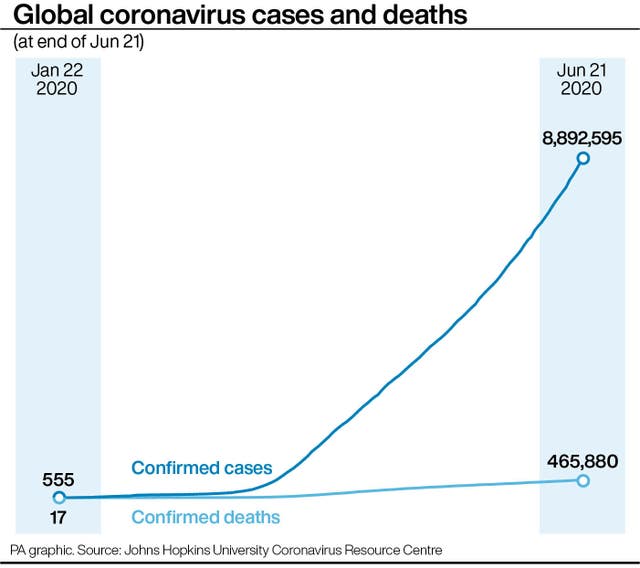
Nicola Sturgeon has said that the growing number of Covid-19 cases around the world is a reminder that people should not become complacent during lockdown.
The world saw the largest daily increases yet in coronavirus cases over the weekend while infections slowed in China and South Korea. In Europe, Germany's R number rocketed from 1.79 to 2.88.
Taking to social media about the increase in the R Number in Germany, the First Minister tweeted: "Another reminder that the virus hasn’t gone away. Our exit from lockdown is underway and with a fair wind I hope we’ll be able to speed up aspects of it. But we mustn’t allow ourselves to think the risk has gone away, or become complacent in any way."
READ MORE: Coronavirus: Swinney to make parliamentary statement about schools crisis
It was reported today that there has been no new Covid-19 deaths recorded in Scotland for the second day in a row, however, trends show that this is usually the case over the weekend.
At the daily press briefing, Nicola Sturgeon said: “The virus hasn’t gone away, there are already countries – China and Germany for example – that are right now dealing with spikes in cases as a result of significant outbreaks. And health officials in South Korea have said they think the country is now experiencing a second wave.
“I know that when numbers of cases and deaths here are continuing to fall it is very tempting for all of us to think it is all over and we should just now quickly get back to normal.
“We are trying to get back to normal and we want to do that as quickly as possible, but let me reiterate my strong view that acting recklessly now would be a serious mistake.
“We must continue to be cautious and all of us must continue to adhere strictly to the public health advice. That will help us continue progress and avoid a resurgence of the virus now.
“But it will also hopefully put us in a much stronger position ahead of the winter months to come.”
Another reminder that the virus hasn’t gone away. Our exit from lockdown is underway and with a fair wind I hope we’ll be able to speed up aspects of it. But we mustn’t allow ourselves to think the risk has gone away, or become complacent in any way. https://t.co/yOFYlN1gge
— Nicola Sturgeon (@NicolaSturgeon) June 21, 2020
Despite clear progress in containing the virus in some regions, especially those that saw early outbreaks, globally the number of new virus cases has soared in recent days in countries such as Brazil, Iraq, India and the United States.
Nearly nine million people have been infected and more than 468,000 people have died, according to figures compiled by Johns Hopkins University.
Experts say the actual numbers are much higher, given limits to testing and the presumed large share of asymptomatic cases.
 (PA Graphics)
(PA Graphics)
The Philippines has reported more than 30,000 infections and 1,169 deaths, among the highest in south-east Asia, and is struggling to help bring home tens of thousands of Filipinos who have lost their work worldwide due to coronavirus lockdowns and economic downturns.
In Iraq, masked workers were setting up makeshift coronavirus wards in Baghdad’s vast exhibition grounds as a long-dreaded spike in infections strained its overstretched hospitals, battered by years of conflict and poor infrastructure.
On Sunday, the World Health Organisation reported the largest single-day increase in coronavirus cases by its count, at more than 183,000 new cases in the latest 24 hours. Brazil tallied 54,771 and the US was next at 36,617, the UN health agency said. India reported more than 15,400.
READ MORE: Coronavirus in Scotland LIVE: Zero new COVID-19 deaths for second day in a row
Experts say rising case counts reflect multiple factors including more testing and spreading infections. More than two-thirds of the new deaths were reported in the Americas.
In east Asia there were signs of progress as South Korea reported 17 new cases, the first time its daily increase fell to under 20 in nearly a month.
The country has been reporting 40 to 50 new cases per day in the past few weeks, amid increased public activity, eased attitudes on social distancing and an uptick in imported cases.
Elsewhere in Asia, Beijing’s increase was in single digits for the first time in eight days. It reported nine cases.
Even in New Zealand, which earlier said it had eliminated local transmissions of the virus, two new cases were reported on Monday among infected people arriving from India and Pakistan. The country of five million people now has nine active cases after having none at all earlier this month.



Why are you making commenting on The Herald only available to subscribers?
It should have been a safe space for informed debate, somewhere for readers to discuss issues around the biggest stories of the day, but all too often the below the line comments on most websites have become bogged down by off-topic discussions and abuse.
heraldscotland.com is tackling this problem by allowing only subscribers to comment.
We are doing this to improve the experience for our loyal readers and we believe it will reduce the ability of trolls and troublemakers, who occasionally find their way onto our site, to abuse our journalists and readers. We also hope it will help the comments section fulfil its promise as a part of Scotland's conversation with itself.
We are lucky at The Herald. We are read by an informed, educated readership who can add their knowledge and insights to our stories.
That is invaluable.
We are making the subscriber-only change to support our valued readers, who tell us they don't want the site cluttered up with irrelevant comments, untruths and abuse.
In the past, the journalist’s job was to collect and distribute information to the audience. Technology means that readers can shape a discussion. We look forward to hearing from you on heraldscotland.com
Comments & Moderation
Readers’ comments: You are personally liable for the content of any comments you upload to this website, so please act responsibly. We do not pre-moderate or monitor readers’ comments appearing on our websites, but we do post-moderate in response to complaints we receive or otherwise when a potential problem comes to our attention. You can make a complaint by using the ‘report this post’ link . We may then apply our discretion under the user terms to amend or delete comments.
Post moderation is undertaken full-time 9am-6pm on weekdays, and on a part-time basis outwith those hours.
Read the rules here